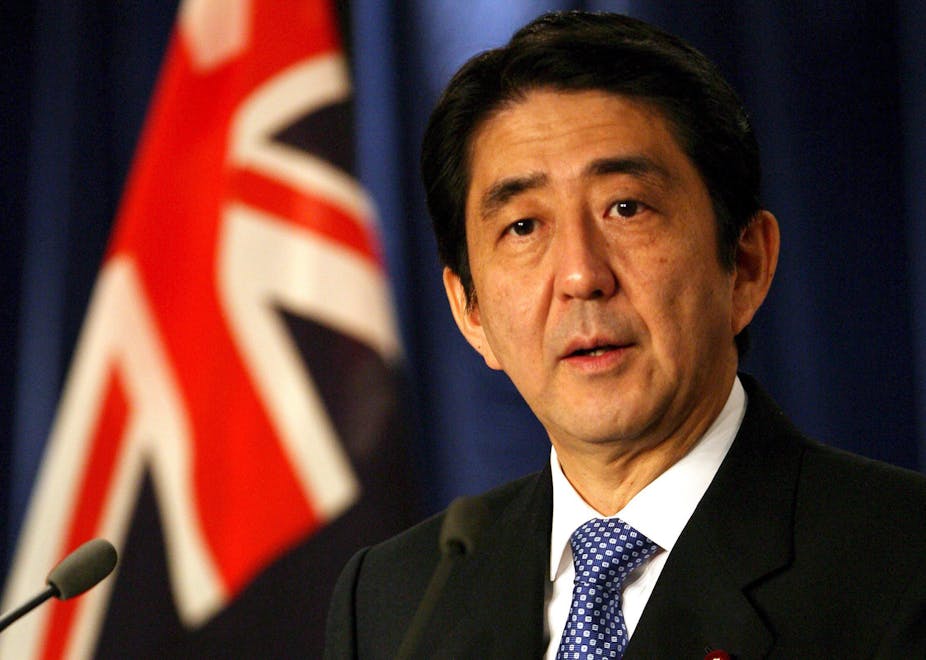The Australia-Japan economic relationship is broad, deep, and has an extensive history. However, issues to do with natural resources – minerals, energy and food – loom large in the politics of the contemporary bilateral relationship.
During the recent resources boom, global resource prices have surged. As an import-dependent economy with few domestic sources, this poses major resource security challenges for Japan. Resource issues dominate Japanese thinking on the Australia-Japan bilateral relationship.
In response to growing resource insecurity, the Japanese government has recently launched a range of policy initiatives to secure its access to resources. These include governmental subsidies for overseas resource investments; “resources diplomacy” initiatives targeted at key suppliers; and the negotiation of free trade agreements that include “resource clauses” to stabilise supply from partners in the region. Australia has been one of the primary targets of Japan’s resource security strategy.
Japan is not alone in facing increasing levels of resource insecurity. Other economies in the Asia-Pacific – notably Korea and China – are also facing a similar dilemma of soaring import prices and lacking local reserves. These governments have also launched similar resource security strategies in recent years, and have also targeted Australia as a key partner.
The resource security strategies of Japan, China, and Korea have increasingly acquired a competitive dynamic. Some analysts have labelled this an Asian “scramble for resources”. The Japanese government feels increasingly anxious about its resource security in the face of competition from neighbouring consumers – particularly China – and the prospects this competition may threaten its resource trade and investment links with Australia.
Conversely, Australia’s primary interests in the Australia-Japan economic relationship are focused on agriculture. Australia is a highly competitive agricultural producer; Japan has been one of Australia’s main export markets for many years. However, extremely high levels of agricultural protection in Japan – especially in the cereals, meat and horticulture sectors – place major barriers to Australia’s presence in the Japanese market.
Despite the economic inefficiency of these policies, successive Japanese governments have been reluctant to liberalise agricultural trade due to powerful agricultural lobbies, the structure of the Japanese electoral system, and cultural sensitivities about food security.
The Australian government has also been reluctant to cut special supply deals with its resource customers. Despite the combined resource diplomacy efforts of the Japanese, Chinese, and Korean governments, Australia has not yet been willing to negotiate preferential agreements for the supply of mineral and energy resources with any of its regional partners.
This is reflected in its FTA negotiations with each of the three Northeast Asian governments, where the Australian government has indicated it will only include a resource clause in any final text if it does not interfere “with the normal working of the market”. This reluctance to cut preferential deals likely reflects an aversion to offering preferential access to any one party, which might then be seen by the others as a form of favouritism.
These competing resource agendas – Japan’s interest in energy and minerals, and Australia’s in agriculture – characterise the current state of Australia-Japan economic relations. Unfortunately, they are also acting as a blockage to the negotiation of further bilateral deals.
This problematic outcome is evident in the current negotiations for an Australia-Japan free trade agreement. Japan has proven extremely reluctant to make meaningful concessions on agricultural trade policy, while Australia has similarly refused to provide any special deals in the minerals and energy sphere. The FTA talks have now been ongoing for some six years, with no clear conclusion in sight.
This situation poses a challenging dilemma for Australian policymakers. There are arguably three possible alternatives for the Australian government in moving the economic relationship with Japan forward.
First, Australia could be more willing to offer Japan resource security guarantees in exchange for agricultural concessions, at risk of disadvantaging its other energy and mineral trade partners.
Second, Australia could lower its expectations from Japanese agricultural concessions, with the risk of agreeing an FTA of reduced to little value for Australian agricultural exporters.
Third, it might choose to maintain its present position. This option forfeits the opportunity to deepen bilateral economic ties with Japan, and instead focuses on building the relationship through multilateral trade initiatives such as the Trans-Pacific Partnership.
At present, the third option most accurately describes the approach under the Rudd and Gillard ALP governments. However, a possible change of government in September 2013 may lead to a change in the Australian approach.
There is no clear answer to which of these three approaches is more desirable. Each entails a differing mix of advantages and risks, and choosing between them necessitates making hard decisions between competing priorities. To advance the Australia-Japan economic relationship, trade-offs will be essential - and will prove vexing for the Australian government in coming years.

